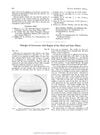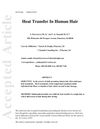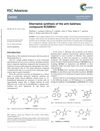 7 citations,
October 1963 in “Textile Research Journal”
7 citations,
October 1963 in “Textile Research Journal” Merino wool fibers change shape with moisture, while human hair shape stays the same.
 6 citations,
May 2020 in “Scientific reports”
6 citations,
May 2020 in “Scientific reports” Researchers identified genes and proteins that may influence wool thickness in sheep.
 6 citations,
November 2017 in “Scientific reports”
6 citations,
November 2017 in “Scientific reports” The R343H mutation in the VDR gene causes vitamin D-resistant rickets with alopecia by impairing specific gene activity.
 5 citations,
January 2017 in “Elsevier eBooks”
5 citations,
January 2017 in “Elsevier eBooks” The document concludes that cosmetics need biocompatible, eco-friendly ingredients due to aging populations and demand for effective products.
 4 citations,
November 2022 in “Acta dermato-venereologica”
4 citations,
November 2022 in “Acta dermato-venereologica” People with hidradenitis suppurativa often have lower vitamin D levels, weaker hip bones, and altered bone metabolism markers.
 4 citations,
June 2019 in “International Journal of Cosmetic Science”
4 citations,
June 2019 in “International Journal of Cosmetic Science” Heat transfer in hair is slower in groups of hair, increasing the risk of damage from high-temperature styling tools.
 4 citations,
September 2016 in “Molecular Medicine Reports”
4 citations,
September 2016 in “Molecular Medicine Reports” Specific genes influence hair and cashmere growth in Laiwu black goats.
 4 citations,
January 2014 in “RSC Advances”
4 citations,
January 2014 in “RSC Advances” A new, less toxic and more efficient method to create the anti-baldness compound RU58841 was developed in 2014.
 3 citations,
January 2012 in “Wageningen Academic Publishers eBooks”
3 citations,
January 2012 in “Wageningen Academic Publishers eBooks” Hair health depends on various factors and hair loss can significantly affect a person's well-being; understanding hair biology is key for creating effective hair care treatments.
 2 citations,
July 2018 in “Journal of Craniofacial Surgery”
2 citations,
July 2018 in “Journal of Craniofacial Surgery” Turbinate reduction during nose surgery improves nasal function.
 1 citations,
January 2021 in “Dermatological reviews”
1 citations,
January 2021 in “Dermatological reviews” Hair transplantation improves androgenetic alopecia with high patient satisfaction.
 1 citations,
September 2020 in “Cochrane library (CD-ROM)”
1 citations,
September 2020 in “Cochrane library (CD-ROM)” The analysis aims to identify the most effective and safest treatments for alopecia areata.
 1 citations,
January 2019 in “Elsevier eBooks”
1 citations,
January 2019 in “Elsevier eBooks” Electrospun matrices help regenerate skin and hair follicles using PCL and collagen scaffolds.
 July 2024 in “Regenerative Biomaterials”
July 2024 in “Regenerative Biomaterials” Dissolvable microneedles with Ginsenoside Rg3 can help treat hair loss by improving drug delivery and stimulating hair growth.
 November 2023 in “Berkala Ilmu Kesehatan Kulit dan Kelamin/Berkala ilmu kesehatan kulit dan kelamin (Periodical of dermatology and venerology)”
November 2023 in “Berkala Ilmu Kesehatan Kulit dan Kelamin/Berkala ilmu kesehatan kulit dan kelamin (Periodical of dermatology and venerology)” Addressing skin changes during pregnancy is important to reduce stress for expectant mothers.
 May 2022 in “bioRxiv (Cold Spring Harbor Laboratory)”
May 2022 in “bioRxiv (Cold Spring Harbor Laboratory)” Primary cilia affect the size and oil production of eye glands but not the oil's makeup.
 July 2021 in “European Journal of Plastic Surgery”
July 2021 in “European Journal of Plastic Surgery” Modern society values both traditional beauty and imperfections, but media pressures lead to more cosmetic enhancements and ethical concerns.
 June 2021 in “bioRxiv (Cold Spring Harbor Laboratory)”
June 2021 in “bioRxiv (Cold Spring Harbor Laboratory)” KIF18B is important for correctly positioning cell division machinery in skin cells, affecting hair follicle development.
 November 2017 in “Asian journal of pharmaceutical and clinical research”
November 2017 in “Asian journal of pharmaceutical and clinical research” Three compounds from Dadap leaves may help treat hair loss.
 August 2017 in “Journal of epidemiological research”
August 2017 in “Journal of epidemiological research” Cancer rates are increasing in developed countries, with estrogen, aging, low vitamin D3, and HPV infection as common causes.

Forensic hair analysis for drugs is now more reliable and accurate.
 April 2016 in “Plastic and reconstructive surgery. Global open”
April 2016 in “Plastic and reconstructive surgery. Global open” The supplement highlighted advancements and challenges in plastic and reconstructive surgery, including the impact of smoking, chemotherapy, and new treatments like Tafluprost for hair loss.
 31 citations,
April 2019 in “Journal of Cutaneous Pathology”
31 citations,
April 2019 in “Journal of Cutaneous Pathology” Hair becomes gray and thin as we age, and while most hair loss in older people is due to genetics, there's a chance for gray hair to regain color under certain conditions.
10 citations,
January 2011 in “Journal of biomedical optics” OCT is a reliable, noninvasive way to measure hair thickness.
 3 citations,
July 2022 in “Dermatologic Therapy”
3 citations,
July 2022 in “Dermatologic Therapy” Magnesium microneedle patches can safely improve under-eye wrinkles when used every other night for 12 weeks.
43 citations,
November 2012 in “Pharmaceutical research” Fractional CO2 laser treatment significantly boosts drug and nanoparticle skin absorption, especially through hair follicles.
35 citations,
August 2016 in “Experimental Dermatology” Fullerene C60 shows promise as a new treatment for various skin conditions.
1 citations,
August 2019 in “IntechOpen eBooks” Mesotherapy might be a useful addition to dental surgery to reduce drug use and side effects, but more research is needed.
 April 2023 in “Our Dermatology Online”
April 2023 in “Our Dermatology Online” Trichoscopy is effective in diagnosing trichotillomania by showing specific hair patterns.
January 2019 in “Figshare” Intralesional corticosteroids are best for mild alopecia areata, and DPCP is best for severe cases.

























